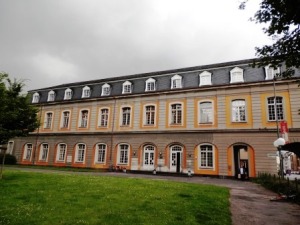The library of my alma mater, Bonn University, has reason to celebrate: 645 books, which had been missing since WWII, have returned home. Among the books, many of them unique, are 11 medieval manuscripts, 2 medieval documents and 39 incunabula.
When the university was founded in 1818, its library was in the main university building, the former palace of the archbishops of Cologne. It was located on the first floor of the wing between the eastern tower and the Koblenz Gate. Actually, from this description, it must have been where the Department of English, American, and Celtic Studies is located today, bringing back many memories.
The palace – and with it the library – was destroyed by bombing on 18 October 1944. Fortunately, some of the contents of the main library had been outsourced to various locations the year before. It was only in 1951 that the volumes were reassembled and made accessible in the newly built library building. It was discovered that approx. 25%, 180,000 volumes, of the pre-war library were missing, among them valuable manuscripts, documents and incunabula. The majority was obviously lost during the bombing, but some of the outsourced contents could not be found either. Nobody knew what had happened to them, whether they had been destroyed or looted, and they were declared irretrievably lost. That is until 2017.
Two years ago, Sotheby’s in London received a large collection of books and manuscripts for sale. Among them were of works by Terentius, Thomas Aquinas, Johannes Nider, Dante Alighieri and Giovanni Boccaccio.
They had been offered by a Belgian lady, Tania Grégoire. Sotheby’s staff investigated the collection and found that “there was something dodgy about it, because there were books without bindings, torn-out title pages and expunged library stamps, in an obvious attempt in the past to conceal their origins”. Not all traces had been eliminated though and the provenance of these works could be established. It is not known how they found their way to Belgium, but there is a suspicion that they might have been stolen during the Belgian occupation after WWII with its headquarters in Bonn.
In September 2017, Sotheby’s tried to ring Michael Herkenhoff, the curator of manuscripts and old books at the University and Regional Library of Bonn (ULB). Herkenhoff was actually on leave that day, when he got a text message from a colleague. The message said that Sotheby’s had phoned, that several lost volumes might have turned up and that the inventory of lost objects had been sent to London. Herkenhoff leapt into action trying to arrange everything. In January 2018, a team from ULB visited the auction house and were able to identify 153 volumes with a total value of approx. 1 million Euro Euro (= 1.58 million AUS $).
In order to achieve an amicable resolution, the library contacted Mme Grégoire, who had inherited the works from her father. Monsieur Grégoire had been stationed in Bonn after WWII, but how the objects came to be in his possession is not known. The team from Bonn visited the daughter in May 2018. She had offered further volumes to an auction house in Brussels and had many more stored at home in a garage, a total of 645 volumes. Fortunately, they had been stored on pallets, away from the wall, so that the damage was only minimal.
With money from the cultural foundation of the German states, they were able to pay Mme Grégoire an undisclosed compensatory payment (though considerably less than their value) and the volumes returned to their home. However, 22 medieval manuscripts and more than 20 incunabula remain lost.
Herkenhoff said that unpacking all the volumes from their protective wrapping was “like Christmas”. At present the volumes are professionally cleaned at the ULB to remove dust and traces of mould which had accumulated over the decades.
The books were welcomed home during an official ceremony, to which Tania Grégoire was also invited. She is very happy to see the volumes returned to a place where they can be restored and will then be accessible to students, lecturers and the whole world.
Herkenhoff explained that Mme Grégoire “showed a moral approach to the matter from the start, having been quite shocked to find how the books had come into her possession, and was at pains to treat us fairly”. He thanked her for her cooperation which made it possible to sort the matter out so quickly and amicably. And Ulrich Meyer-Doerpinghaus, the director of the ULB, said that they had retrieved a “part of our identity”. A happy ending for all 645 volumes and everyone who was involved in their return.
Further Reading:
Baumann, L., ‘Return of Over 600 Volumes Missing Since World War II‘, Sotheby’s (12 April 2019). URL: https://www.sothebys.com/en/articles/return-of-over-600-volumes-missing-since-world-war-ii [last accessed 15 April 2019]
Conolly, K., ‘Germany welcomes back priceless books lost in second world war‘, The Guardian (11 April 2019). URL: https://www.theguardian.com/world/2019/apr/11/germany-welcomes-back-priceless-books-lost-in-second-world-war [last accessed 14 April 2019]
Kulturstiftung der Länder, ‘Pressemitteilung: Vermisste Bücher zurück in Bonn‘ (11 April 2019). URL: https://www.kulturstiftung.de/vermisste-buecher-bonn/ [last accessed 15 April 2019]
Tittelbach, S., ‘Uni-Bib bekommt verschollene Bücher zurück‘, WDR Lokalzeit aus Bonn (11 April 2019). URL: https://www1.wdr.de/mediathek/video/sendungen/lokalzeit-bonn/video-uni-bib-bekommt-verschollene-buecher-zurueck-100.html [last accessed 12 April 2019]. This includes a link to the TV coverage of the find (in German).


